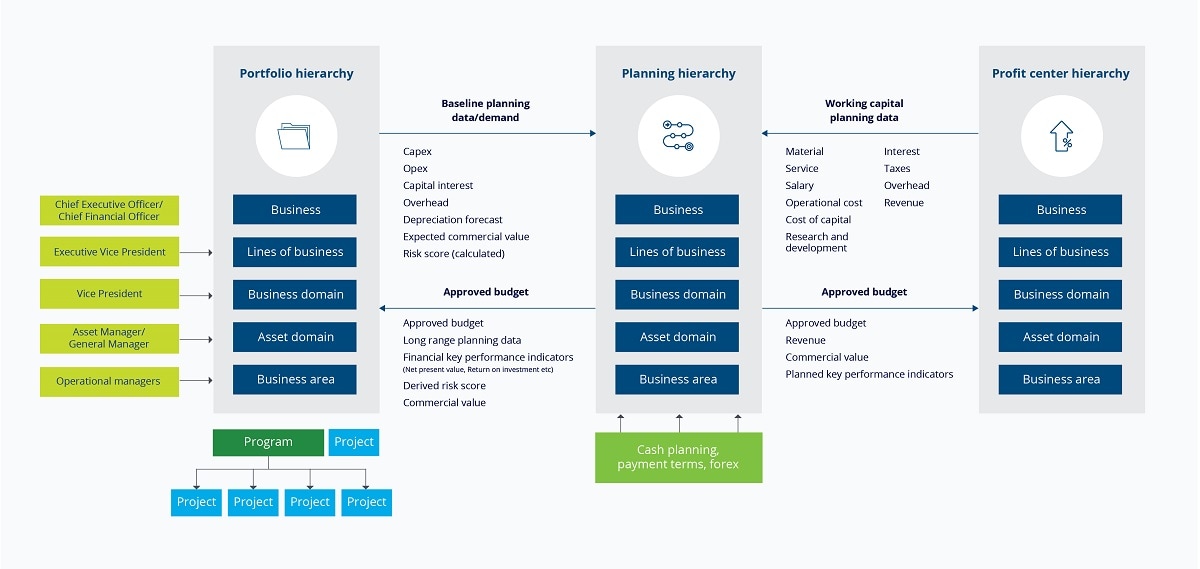Embedding capital efficiency within your ERP upgrade has been saved

Perspectives
Embedding capital efficiency within your ERP upgrade
Reimagine the organization’s data foundation with ERP transformation
Since many companies find it challenging to deliver on capital commitments and maintain steady returns on capital investment, next-gen enterprise project portfolio management (EPPM) should integrate capital planning into the enterprise resource planning (ERP) transformation process to improve the organization’s performance and create operational effectiveness.
Expanding the benefits of your ERP upgrade
Upgrading ERP software systems can be a challenge. Through these transformations, which also entail updating fundamental business processes and models to keep pace with the changing business environment, leaders have an opportunity to rationalize tools and systems through these transformations, implement leading practices, and fix what’s not working.
For organizations with large capital spend portfolios, capital planning, allocation, and project execution—though key business processes—may present an enduring challenge. Typically managed in disconnected systems outside the ERP, this lack of integration creates gaps in the big financial reporting picture. Similarly, capital allocation and project execution are often managed in separate systems from capital planning. Within the ERP, they are often reported as actual costs and accruals against high-level budgets but with no real visibility into progress and performance, introducing differing master data and multiple sources of truth.
In our experience supporting system implementations and ERP transformations, if companies are considering upgrading their ERP system, they should also consider including their capital planning, capital allocation, and project execution activities in the business transformation. And the good news is, even if an ERP system upgrade is already underway, it’s not too late for a capital planning integration.
An operational and technological inflection point
The next generation of ERP and EPPM solutions is already here and happening. With systems and information continuing to migrate to the cloud and legacy systems heading toward obsolescence, leaders overseeing large capital budgets face a decision inflection point for their ERP transformation, data governance, and standards on whether to include EPPM as part of that journey. Boards are demanding ever-tighter management of capital spending, and it’s important to make sure that processes are as transparent, auditable, and efficient while outcomes are visible and predictable. Leaders need to consider several questions:
- How to bridge the gap between the C-suite and what’s happening on the ground?
- How to better integrate capital planning and project execution in its ERP ecosystem?
- Can a next-gen ERP and integrated EPPM systems help unify what have historically been separate workstreams disconnected from the ERP?
- Is it best to work with one provider’s suite of solutions or integrate specialist solutions from best-of-breed providers?
Moving toward next-generation capital planning
Many organizations have managed capital planning work processes disconnected from an ERP system, which typically provides corporate financial reporting. But project performance and shifts in corporate expectations in recent years have highlighted to leadership the necessity for better capital planning, allocation, and project management. Integrating the separate activities and workstreams allows near real-time reporting and decision-making.
While it may seem that an ERP system can natively provide the required functionality to facilitate this shift in focus, our experience indicates that few ERPs can provide the level of detail required by capital planning end users. In fact, many will require a complementary EPPM system that provides capital planning and project execution capability, which then integrates with the ERP for full visibility. But ERPs can’t necessarily solve everything. The goal should be more integration and collaboration between people, processes, systems, and data.
A single source of truth
An ERP transformation can simplify and consolidate disparate capital planning and project execution systems and tools into an enterprise PPM system that integrates with the next-gen ERP. In fact, an ERP transformation is often an opportunity to go a step further and reimagine the organization’s data foundation, data model, and solution architecture. Doing so can help create a collaborative environment with defined master data, connected outputs, and, most importantly, one single source of truth. The key is aligning the various organizational hierarchies: portfolio, planning, and profit center. Each runs through lines of business and an asset domain, and aligning data flows across hierarchies can help leaders make informed strategy decisions.
Connected data models enhance the availability of processed information on demand

Get in touch
J. Paul Campbell |
Mike Whalen |
Michelle Meisels |
Amitava Biswas |
Recommendations
Infrastructure and Capital Projects Consulting Services
Valuation engineering and capital projects
Vigilance should never threaten opportunity
Moving ahead confidently with transaction advisory services


